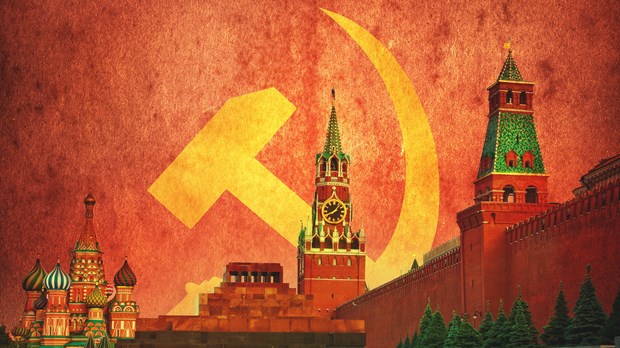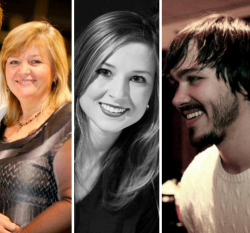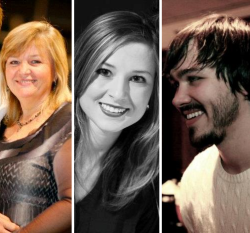Communism Really Was that Bad

Olga Spisovskiy, her son-in-law, Peter Klyachenko, and her daughter-in-law, Lily Spisovskiy, each represent a different Christian family who moved to the United States from Russia in the 1990s. In Soviet Russia, their families suffered religious persecution, jail time, horrifying accusations, and harsh rejections, even from their own families. Although their stories are sobering, their past experiences give them a unique and important perspective on religious freedom, both under communistic Russia and in the United States. Here's what they had to share about their experiences with religious persecution and their understanding of what true freedom looks like.
Your family lived for years as Christians under communism in the Soviet Union. What was that like?
Olga: The government installed small microphones into our walls. People would come to our house and say, "We need to check your electricity." We knew they weren't there to check anything. But we had to speak very carefully in the house, because we knew they were listening to everything we said, and my father was afraid of us being thrown in prison.
My sister became a Christian at 18. At the time she was the head of her high school's Communist Youth Party, which was prestigious. She told the CYP director, "I cannot do this any longer because I accepted Christ into my life."
The school informed the KGB of her conversion, and as a result, the KGB spent years trying to take me and my siblings away from my parents, under the false accusation that my parents forced my sister to convert to Christianity. Every few months, my sister and my mother would drive to the state office so my sister could testify that her conversion was her own decision. Finally, when her story didn't change after years of questioning, the KGB had to give up. They had no case against my parents.

Olga, left; Lily, middle; Peter, right
Also, a few times a month, the KGB would stop my father on his way to work and take him to their office. There, they would question him about the goings on of the church—details of meetings, who was attending. Those types of things. They'd hold him for two days without food or water. We used to say they wanted him to be like Judas; they wanted him to betray the church.
It wasn't a big deal for the KGB to operate this way. But for my father to agree to be that person would have killed him right then. He never told them anything.
My mama eventually went to the KGB officer in our area and said, "If you're not going to stop this, I'll tell everybody. I've had it. The whole world will know what you're doing to us."
The KGB officer stopped taking him after that.
Lily: When my mom was in high school, one day the teacher called her to the front of the class so her peers could ridicule her for her faith. They told her, "You're never going to go to college. You're never going to make anything of yourself. You're going to be just like your parents, working in a factory." They wanted to push her down, to make her give up on her faith.
When my father went public with his faith, his parents told him to leave. They said, "It's either us or God." In the Soviet Union, being a Christian was thought of as a mental disease. It was embarrassing for my grandparents to have a "mentally disabled son."
He was 17 when he left. He tried to go to college in Kiev, but it was hard to go to school. Universities accepted him, but when they found out he was a Christian, they'd expel him. That happened many times.
What was the most difficult persecution you faced?
Olga: My brother died of leukemia at age 16. He died in the hospital. But people said my parents killed him; sacrificed him to God. That was hard. I was 12 at the time. Kids would say, "Is it true that your parents killed your brother?"
We had 400 people at the funeral. My father invited preachers and an orchestra; they made such a procession. But the KGB took my dad from the funeral and made him pay for all of the cars in the procession—one month's wages—and he had to pay it right there. They had no right to do that. But they did it anyway.
What is it like coming from that kind of persecution to living in the United States?
Lily: Good and bad. There were no lukewarm Christians in Russia. You were either all in or all out, because following God meant giving up everything. There's no "in the middle." My parents say freedom is good, but sometimes too much freedom is bad—people here get lost and confused. Everything's so liberated; there are all these gray lines that can sometimes hinder your walk with the Lord. Here they say, Well, this isn't so bad. In Russia it wasn't like that.
Olga: In Russia we understood one thing—we could have died any day for being Christian. It wasn't a joke. In the Red Army they'd put 500 boys in a small area and say, "Christians, step up, so everyone knows who you are." In the Red Army we knew people who were killed just for being Christian. The soldiers would pick fights just to kill them.
In America, my husband told our small group, "We could have died," and the pastor and his friend laughed.
They said, "Did you hear? He could have died." It was funny to them.
And I thought, Yeah, you weren't in a situation like that. You have no idea what you're talking about.
Peter: I think knowing where we came from makes us stronger; we're part of something bigger than ourselves. But it ends at a certain point. It becomes history. We have to build our own relationships with God.
How does your history affect your view of religious freedom?
Olga: In America it's different. We're thankful to be here; to have freedom of religion. We really value this freedom.
To me, the word Christian means a lot. It means you're all in. But here, it means something different.
At the Christian preschool I worked for after I'd moved to America, I was talking to kids about Christ when the owner told me, "We can't talk to kids about Jesus."
I said, "Why not? This is a Christian school, right?"
She said, "Yes, but we have Muslims and different beliefs in our classroom and we can't offend anyone."
So, it's different here.
But Christ is the same everywhere. It doesn't matter where you live. When we over-think in any situation, we can justify our actions. We can say we don't have to be as radical for Jesus. Why should we? It hurts. But when we are quickened by the Holy Spirit and we do what he tells us to do, we don't think, we just do.
Christ was there for us all the time in the Soviet Union. And now, it's over. Praise God. But I wouldn't do it any other way. You have to suffer to understand all of it. Suffering helps, actually. It deepens your understanding and knowledge of Christ, because Christ is very deep. And he calls to our deep because he's deep within us. And when he calls to himself within us and we find this connection, then we go deeper. Then we become more like him, because it's all him. It's not us.
Read more articles that highlight writing by Christian women at ChristianityToday.com/Women
 Read These Next
Read These Next

 Is Your Worship Missing Something? Probablemente.Embracing the gifts of the global church
Is Your Worship Missing Something? Probablemente.Embracing the gifts of the global church Ministering to Military Families5 tangible ways to better serve our troops' families from a former Navy brat and current Army wife
Ministering to Military Families5 tangible ways to better serve our troops' families from a former Navy brat and current Army wife
 Seeking God's Calling for Your LifeHow to hear what he’s saying
Seeking God's Calling for Your LifeHow to hear what he’s saying








 Homepage
Homepage

